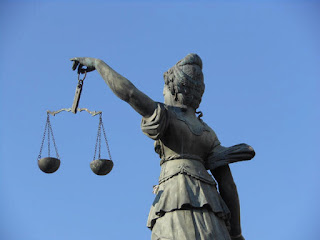Fix Me!
Those were the words of my heart.
How many times had everything inside of me shouted those words! They appeared to have burned through the decay in a desperate plea to be heard before it was too late, before the ever-creeping blanket of rust could swallow the carriage whole.
I thought of a time when my younger brother arrived home on a Saturday, downcast, because his friend, Henry, had purposely excluded him. It was not the first time this had occurred, and my ten-year-old sense of justice simply could not brook any more unpunished bad behavior. I was going to "fix" things.
Hastily, I transformed my bunk bed into a prison cell, then proceeded to lure young Henry to the prepared location — employing every disreputable method of deception my decade of experience could procure, including fibs and even a touch of physical force. My dad had an ancient set of handcuffs, which I used to secure him to one of the posts, where I left him to rot for what seemed a whole day, but was really an afternoon. I fed him bread and water — as they did in the movies — and at the end of his sentence, lectured him long and hard about his crimes.
 |
| Photo credit: mikecogh / Foter.com / CC BY-SA |
As Henry left, his dejection was evident, and even though I felt he deserved it, my victory was quelled by a befuddling sense of wrong-doing. He was too young to comprehend what I was trying to accomplish. I was just a mean girl who locked him up for something he didn't understand. I did my best to revive his spirits, but he just stared at me with these vacant, troubled eyes, and I knew that Henry understood with absolute clarity that I had intentionally hurt him.
My fixing hadn't gone well.
The old adage teaches us that people don't always remember what we said or did, but they always remember how we made them feel.
Just a few days ago — and many years later — as I was on my way home home, I noticed a young man sitting on a park bench. His head was in his hands and the very position of his bodily stance advertised a forlorn state.
My inner-radar detected a clear distress signal, and one that couldn't be ignored or justified by the flippant excuses of a rushed society. Once again, of its own accord, my car seemed to pull itself over, and I sat watching, unsure... after all, what was I to do? I had no words to fix him.
Experience had taught me the value of listening to myself, and sooner than expected, I was out of the car and approaching the bench, where I casually sat down... and did nothing. I just sat there. After a few minutes, the solution suddenly came to me. I felt compelled to pat this young man on the back, which I did — gently, but surely.
 The young man looked up, surprised by my presence. His eyes reflected deep wounds. He looked at me the same way I had at the words on that car. After what seemed an age, he gave a subtle nod, lifted a hand, and offered it to me, and in a shaky voice — rife with emotion — told me his name... Henry. I shook his hand, and responded in kind, after which, we both got up and left. And that was that. Nothing more was needed.
The young man looked up, surprised by my presence. His eyes reflected deep wounds. He looked at me the same way I had at the words on that car. After what seemed an age, he gave a subtle nod, lifted a hand, and offered it to me, and in a shaky voice — rife with emotion — told me his name... Henry. I shook his hand, and responded in kind, after which, we both got up and left. And that was that. Nothing more was needed.Though we were strangers, we spoke the common language of human understanding. All he needed to know was that someone, somewhere, saw him — really saw him, and in a small measure, shared his grief, whatever it may have been. Sometimes, the genuine concern of our hearts shines through and does all of the talking for us — thank goodness!
In life, the fixing of other people is not a true option, and is, in itself, a sort of evil. It takes away from the agency of others to choose how they will act and live, and denies the growth of character. The first Henry had no choice in his imprisonment, and the second had to choose to accept my proffered solace. A brave decision. Though we cannot fix each other, we can offer the occasional tune-up by uplifting and refraining from harsh words, by seeing the good when the bad is so readily evident, and by the pouring-out of silent pep talks as each of us embark upon the great task of overhauling our souls.
A quote from another Henry:
Three things in human life are important. The first is to be kind. The second is to be kind. And the third is to be kind. ~ Henry James
May we strive to be kind.
Eliott
*The names of the people in this post, though identical in real life, were changed for reasons of privacy.

No comments:
Post a Comment
Note: Only a member of this blog may post a comment.